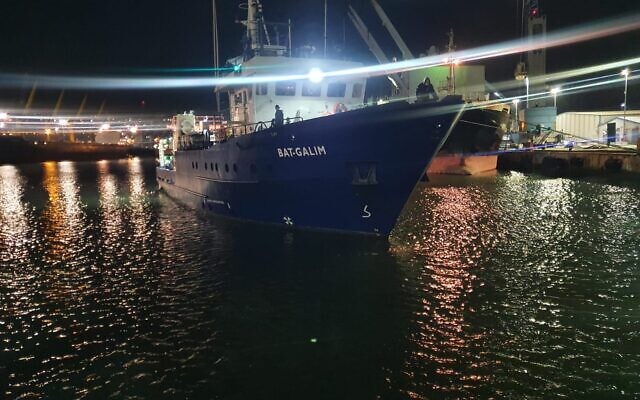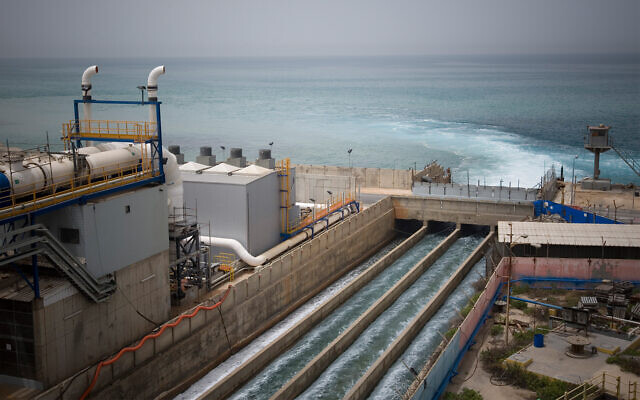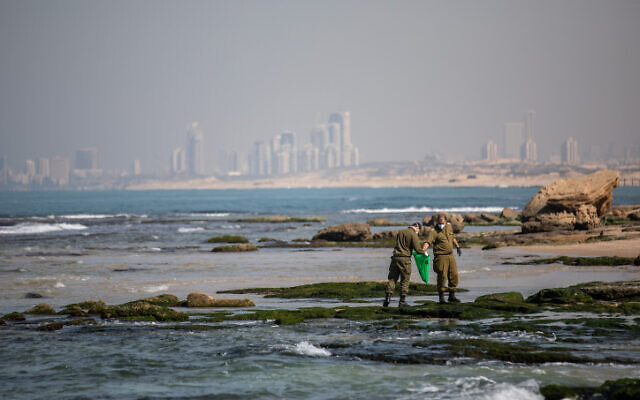Environment Minister Zandberg says emergency plans to be readied as officials scramble to assess threat from ‘suspicious patches’ 20-40 kilometers from shore

The Environmental Protection Ministry said Wednesday that a suspected oil spill detected the night before off the coast has the potential to become a national or regional pollution incident, and gave instructions for emergency plans to deal with such a situation to be readied for use.
Observations so far have detected “suspicious stains” on the surface of the sea 20 to 40 kilometers (12-24 miles) from the shore along a stretch of coast between the central cities of Rishon Lezion and Netanya.
A dedicated situation room has been set up in Haifa, and Environmental Protection Minister Tamar Zandberg has approved designating the incident as Tier-3, meaning it could become a major maritime incident of either national or regional proportion, the ministry said in a statement.
The decision to raise alertness to Tier-3 was made in light of the suspected spill’s geographic location and swift movement. This will remain in place until the situation is clarified, the ministry said.
“Currently a number of private vessels under the direction of the ministry are prepared to start carrying out blocking and pumping if possible,” the statement said.

The R/V Bat-Galim deep-sea research ship, jointly operated by the ministry and the Israel Oceanographic and Limnological Research institute, was preparing to set sail with equipment to take samples and spray dispersants into the water.
“If it is discovered that it is a spill that extends over many kilometers, the ability to treat it at sea will be quite limited,” the ministry warned.
The ministry said that further close-quarter checks will be carried out later in the day, including sea patrols and flyovers, “in order to obtain a clear picture of the situation and the measures that can be taken out at sea.”
Officials will also build models to study how water and wind currents will influence the situation, the ministry said.
The IDF was assisting with sea and air patrols, and with formulating a response, and the IDF Home Front Command was also preparing to assist if a spill reaches the shore.
All relevant bodies, including the Defense Ministry, the Society for the Protection of Nature, and local coastal municipalities were involved in assessing the situation and have been instructed to prepare national emergency plans for activation, the statement said.
The Israel Water Authority said in a statement that so far no special instructions had been issued to the country’s massive desalination plants, which provide 80 percent of the nation’s drinking water.
The authority said that the plants’ filtration systems were working as usual and if there is any suspicion of pollution, pumps will immediately be shut down.
“Even in such a case, a disruption in the water supply is not expected,” the authority said, adding that it is prepared to continue supplying water in any scenario.

The Environment Ministry has given no details on the origin of the spill, which comes almost exactly a year after the country suffered one of its worst environmental disasters.
Israel was taken by surprise on February 18, 2021, when massive amounts of tar began washing onto its coastline following an oil spill in stormy weather, along with the corpse of a fin whale some 17 meters (55 feet) long.
Over the following days, it became clear that beaches all along Israel’s Mediterranean coast had been contaminated and that wildlife had paid a heavy price.

In the wake of that leak, the sale of Mediterranean fish was temporarily suspended and beaches were closed. Thousands of volunteers rallied to help with the cleanup. The long-term damage to ecosystems still remains to be seen.
Evidence from an investigation by the Environmental Protection Ministry at the time indicated that the leak of tens of tons of crude oil took place on February 1 and 2, some 130 kilometers (80 miles) out at sea, and came from the Syrian-owned tanker Emerald, which was not insured. The London-based International Oil Pollution Compensation Fund has agreed in principle to pay damages.
As reported by The Times of Israel
